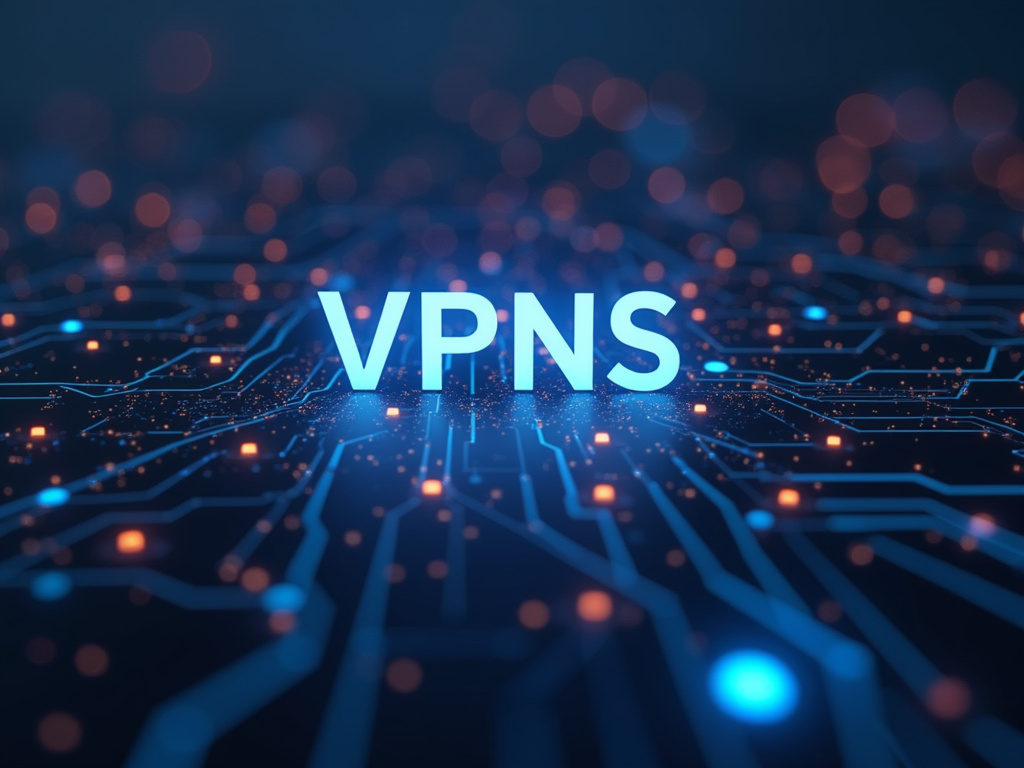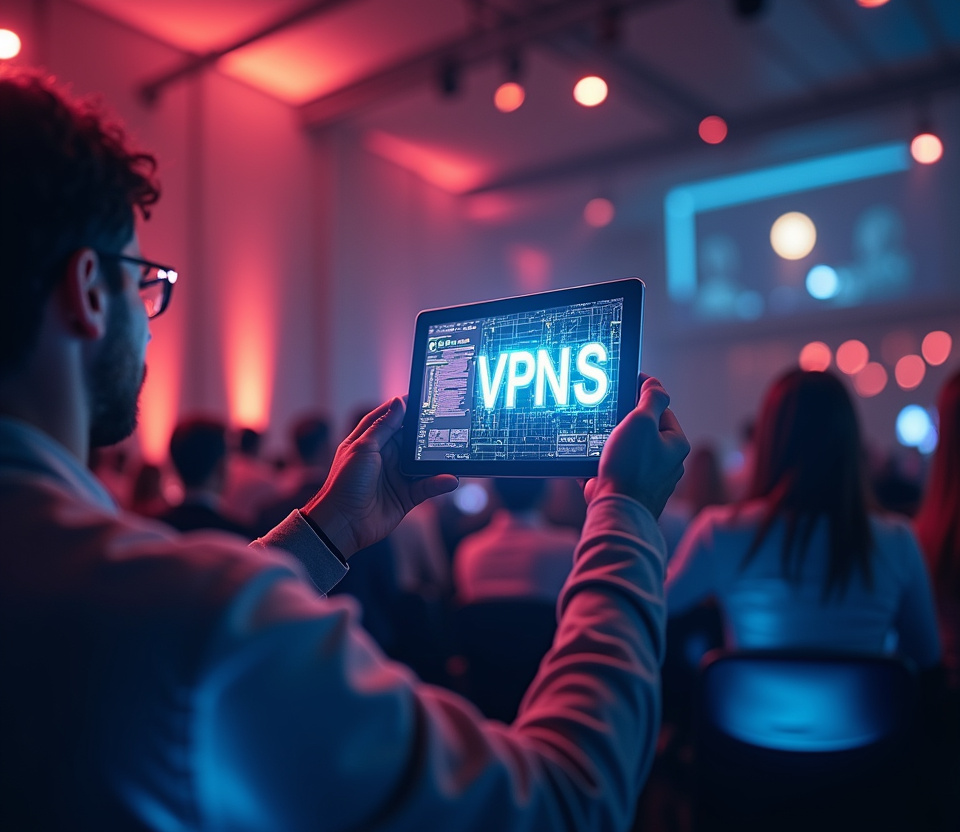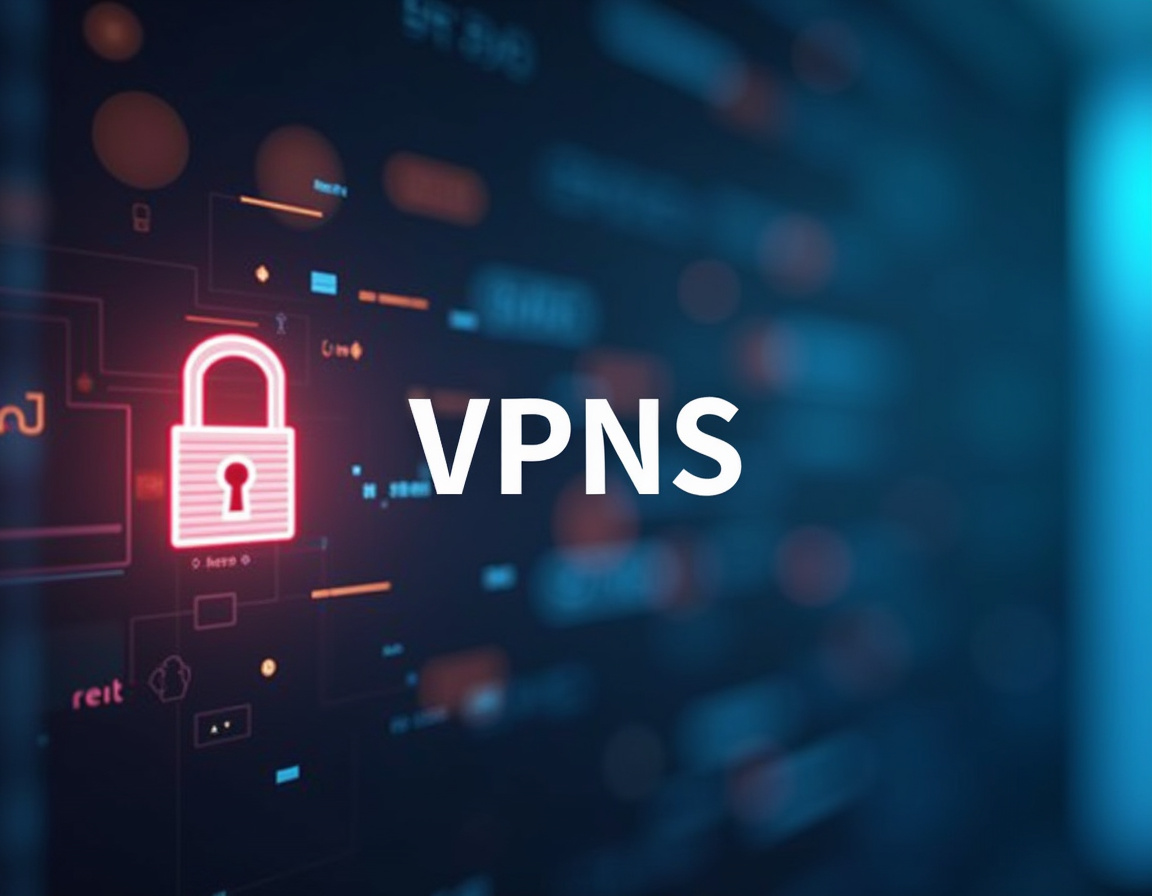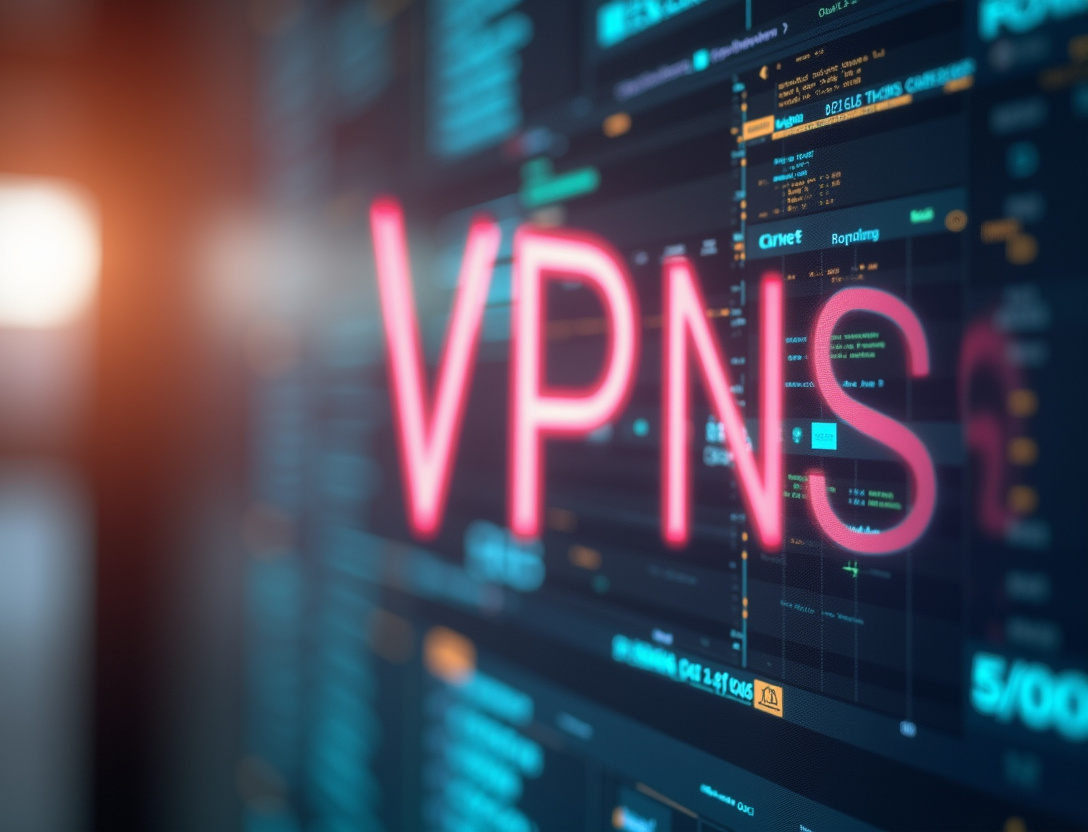VPNs for Academic Conferences: Securing Participant Data

Table of Contents
participant data security
In today's interconnected world, academic conferences have become vital platforms for researchers, educators, and industry professionals to exchange ideas, collaborate on projects, and disseminate knowledge. These events often involve the sharing of sensitive participant data, including personal information, research findings, and intellectual property. As such, ensuring the security and privacy of this data is of paramount importance.
This article delves into the use of Virtual Private Networks (VPNs) as a crucial tool for safeguarding at academic conferences, exploring various options that secure communication, enhance data privacy, and promote a safe and productive environment for all attendees. The use of a VPN in this setting, therefore, transcends simple convenience, becoming a necessity for safeguarding intellectual property and sensitive personal details exchanged in a professional environment. The rise of cyber threats and data breaches has made it imperative for conference organizers to implement robust security measures to protect participant data and maintain the integrity of the event.
A data breach doesn't just represent a security failure; it undermines trust in the conference organizers and can have lasting repercussions for participants whose information is compromised. VPNs provide a secure and encrypted connection, shielding sensitive information from unauthorized access and eavesdropping. By routing internet traffic through a secure server, VPNs mask the user's IP address and location, making it difficult for hackers to track and intercept data.
This is especially important when participants are connecting to public Wi-Fi networks, often prevalent at conference venues, which are notorious for their lack of security. Public Wi-Fi networks are often unsecured, making them vulnerable to various cyberattacks, including man-in-the-middle attacks and packet sniffing. Without a VPN, participants' data can be easily intercepted by malicious actors on the same network.
Furthermore, VPNs can help prevent man-in-the-middle attacks, where malicious actors intercept communication between two parties. By encrypting the data transmitted over the network, VPNs ensure that even if an attacker intercepts the traffic, they will not be able to decipher its contents. This protection extends not only to personal information but also to sensitive research data and intellectual property shared during the conference, bolstering .
The ability to securely share and discuss groundbreaking research is a cornerstone of academic progress, and VPNs play a vital role in facilitating this exchange without the fear of intellectual property theft or data compromise. The use of VPNs aligns with ethical considerations and regulatory requirements for data protection. Many countries have implemented strict data privacy laws, such as the General Data Protection Regulation (GDPR) in Europe, which mandates organizations to protect the personal data of individuals.
By implementing VPNs, conference organizers can demonstrate their commitment to data protection and comply with these regulations. Failure to do so can result in significant fines and reputational damage. Beyond the financial penalties, a failure to protect participant data can severely damage the reputation of the conference and the organizing institution, potentially deterring future participation and undermining the credibility of research presented.
In addition to protecting against external threats, VPNs can also help prevent internal data breaches. By limiting access to sensitive data to authorized personnel and encrypting data at rest, VPNs can reduce the risk of insider threats. This is especially important in academic settings, where there may be a large number of individuals with access to sensitive information.
The comprehensive security offered by a VPN ensures that only authorized individuals can access and manage sensitive conference data. The use of in conference settings is a proactive measure that demonstrates a commitment to data security and participant privacy. By investing in VPN technology, conference organizers can create a secure and trustworthy environment for attendees, fostering collaboration and innovation without compromising data integrity.
Choosing the right VPN for an academic conference requires careful consideration of several factors. These include the number of participants, the types of data being shared, and the level of security required. The scale of the conference will directly impact the bandwidth and server capacity required from the VPN.
The sensitivity of the data being shared should dictate the strength of the encryption protocols and the security features offered by the VPN. Conference organizers should also consider the ease of use and compatibility of the VPN software, ensuring that participants can easily connect and use the VPN without technical difficulties. A complex or unreliable VPN can lead to frustration and decreased participation.
Scalability is another important factor, as the VPN should be able to handle the increased traffic volume during the conference. A VPN that struggles to handle peak usage can lead to slow connections and disruptions in communication. Ultimately, the choice of VPN should reflect a comprehensive assessment of the conference's specific needs and priorities, ensuring that the selected solution provides the optimal balance of security, performance, and user-friendliness.
academic conference VPN
When selecting an , it's essential to prioritize robust security features and encryption protocols. Encryption is the process of converting plain text into an unreadable format, making it impossible for unauthorized individuals to decipher the information. This is the cornerstone of any effective VPN and a non-negotiable requirement for protecting sensitive academic data.
VPNs use various encryption protocols, such as AES (Advanced Encryption Standard) and OpenVPN, to secure data transmitted over the network. AES is a widely used encryption standard that provides strong protection against brute-force attacks, making it extremely difficult for hackers to crack the encryption and access the underlying data. OpenVPN is an open-source VPN protocol that is highly customizable and secure, allowing for tailored security settings to meet the specific needs of the conference.
Conference organizers should choose a VPN that uses strong encryption protocols to ensure that participant data is protected from unauthorized access, guaranteeing . The strength of the encryption directly correlates to the level of security provided, so opting for the highest available standard is crucial. Another important security feature is a kill switch, which automatically disconnects the user from the internet if the VPN connection drops.
This prevents data from being transmitted over an unencrypted connection, protecting the user's privacy in the event of a VPN failure. A kill switch acts as a fail-safe mechanism, ensuring that sensitive data is never exposed to the open internet. A no-logs policy is also essential, as it ensures that the VPN provider does not collect or store any user data, such as browsing history or IP address.
This provides an additional layer of privacy and security for participants, assuring them that their online activities are not being tracked or monitored. A strict no-logs policy is a fundamental requirement for maintaining user privacy and building trust. Combining a kill switch with a no-logs policy creates a robust defense against data leaks and privacy breaches.
In addition to security features, conference organizers should also consider the performance and reliability of the VPN. A slow VPN can significantly impact productivity and frustrate participants, hindering their ability to effectively participate in conference activities. Therefore, it's essential to choose a VPN that offers fast and stable connections.
The server infrastructure of the VPN provider directly impacts its performance and reliability. The number of servers and server locations is also important, as it determines the speed and availability of the VPN. A VPN with a large number of servers and server locations can provide better performance and reliability, especially during peak usage times.
A diverse server network allows users to connect to servers that are geographically closer to them, reducing latency and improving connection speeds. User-friendliness is another important factor, as participants may not be familiar with VPN technology. The VPN software should be easy to install, configure, and use.
A simple and intuitive interface can significantly improve user adoption and satisfaction. Conference organizers should also provide clear instructions and technical support to assist participants with using the VPN. Providing step-by-step guides and offering readily available technical assistance can help participants overcome technical challenges and ensure a smooth VPN experience.
To ensure the effective implementation of a VPN at an academic conference, a comprehensive plan should be developed that outlines the roles and responsibilities of different stakeholders. This plan should address various aspects, including VPN selection, deployment, user training, and ongoing maintenance. A well-defined implementation plan is essential for ensuring that the VPN is effectively integrated into the conference infrastructure.
The first step is to assess the specific security needs of the conference. This involves identifying the types of data being shared, the potential risks to data security, and the security measures that are already in place. A thorough security assessment is crucial for determining the appropriate level of protection required.
Based on this assessment, conference organizers can determine the appropriate level of security required for the VPN. This includes identifying the necessary encryption strength, security features, and server capacity. Next, a VPN should be chosen that meets the security requirements and budget of the conference.
Conference organizers should carefully evaluate different VPN providers and compare their security features, performance, and pricing. A comprehensive comparison of VPN providers is essential for making an informed decision. It's also important to read reviews and testimonials from other users to get an idea of the VPN's reliability and customer support.
Real-world user feedback can provide valuable insights into the VPN's performance and customer service quality. Once a VPN has been selected, it needs to be deployed and configured. This may involve installing VPN software on conference computers and devices, configuring network settings, and creating user accounts.
Proper deployment and configuration are critical for ensuring that the VPN is functioning correctly and providing the intended level of security. Conference organizers should also provide clear instructions and technical support to assist participants with using the VPN.
Communication protection
is a critical aspect of VPN usage at academic conferences, ensuring that all forms of digital communication remain secure and private. This includes email exchanges, instant messaging, video conferencing, and file sharing. By encrypting all network traffic, VPNs prevent eavesdropping and unauthorized access to sensitive communications, creating a secure and confidential environment for participants to exchange ideas and collaborate on projects.
The confidentiality of communications is paramount in academic settings, especially when discussing unpublished research findings or sensitive data. Without a VPN, these communications are vulnerable to interception and potential misuse. Protecting these communications strengthens at academic conferences.
Email communications are a primary mode of communication at academic conferences, used for sharing presentation materials, coordinating schedules, and exchanging feedback. VPNs encrypt email traffic, preventing hackers from intercepting and reading sensitive email messages. This is particularly important when discussing confidential research findings or sharing personal information.
Instant messaging platforms like Slack or Microsoft Teams are also commonly used for real-time communication during conferences. VPNs encrypt instant messages, ensuring that unauthorized individuals cannot access and read private conversations. Video conferencing tools like Zoom or Google Meet have become increasingly popular for remote participation in academic conferences.
VPNs encrypt video and audio streams, preventing eavesdropping and ensuring the privacy of video conferences. File sharing services, such as Dropbox or Google Drive, are often used for sharing large files during conferences. VPNs encrypt files being uploaded and downloaded, preventing unauthorized access and ensuring the integrity of the data.
Beyond the specific channels, consistent VPN usage reinforces a culture of security awareness. When choosing a VPN for at an academic conference, it's important to consider the VPN's ability to handle different types of traffic. Some VPNs may be optimized for web browsing but may not perform well with video conferencing or file sharing.
Conference organizers should choose a VPN that can handle all types of traffic efficiently and reliably. The VPN's server locations are also important, as they can affect the speed and latency of communication. Conference organizers should choose a VPN with servers located in regions where most participants are located.
The VPN's bandwidth capacity is also a critical factor, as it determines the number of participants who can simultaneously use the VPN without experiencing performance issues. Conference organizers should choose a VPN with sufficient bandwidth capacity to accommodate all participants. Additionally, the VPN should offer compatibility across various devices and operating systems (Windows, macOS, iOS, Android), ensuring seamless access for all attendees regardless of their preferred technology.
This level of inclusivity is crucial for a successful and secure conference environment. Implementing a VPN for communication protection at an academic conference requires clear communication and user training. Participants need to understand the importance of using a VPN and how to connect to it properly.
Conference organizers should provide clear instructions and technical support to assist participants with using the VPN. A well-designed communication plan can significantly improve VPN adoption rates. This plan should include pre-conference announcements, on-site instructions, and post-conference reminders.
Pre-conference announcements can inform participants about the importance of using a VPN and provide instructions on how to download and install the VPN software. On-site instructions can provide step-by-step guidance on how to connect to the VPN and troubleshoot common issues. Post-conference reminders can encourage participants to continue using a VPN to protect their online privacy and security.
In addition to communication, user training is also essential. Conference organizers should provide training sessions or workshops on how to use a VPN and protect online privacy. These training sessions can cover topics such as: Choosing a strong password, recognizing phishing scams, securing personal devices, understanding data privacy regulations.
By providing clear communication and user training, conference organizers can create a culture of security awareness and ensure that participants are able to protect their communications effectively.
Privacy enhancement
through the use of VPNs at academic conferences goes beyond simply securing communication channels; it encompasses a broader strategy to protect the identities and online activities of participants. By masking IP addresses, encrypting data, and preventing tracking, VPNs create a layered approach to privacy that safeguards participants from various threats and intrusions. This is particularly crucial in an era where data collection and surveillance are becoming increasingly pervasive.
The commitment to demonstrates a respect for the autonomy and digital rights of conference attendees. One of the primary ways VPNs enhance privacy is by masking IP addresses. An IP address is a unique identifier that can be used to track a user's location and online activity.
By routing internet traffic through a VPN server, the user's real IP address is hidden and replaced with the IP address of the VPN server. This makes it difficult for websites, advertisers, and other third parties to track the user's online behavior. In an academic conference setting, this can prevent attendees from being targeted with unwanted advertising or having their research interests tracked.
Encrypting data is another crucial aspect of privacy enhancement. VPNs encrypt all data transmitted over the internet, making it unreadable to unauthorized individuals. This prevents eavesdropping and ensures that sensitive information, such as passwords, financial details, and research data, remains private.
Furthermore, VPNs can prevent tracking by websites and advertisers. Many websites use cookies and other tracking technologies to collect data about users' browsing habits. VPNs can block these tracking technologies, preventing websites from collecting data about users' online activity.
The ability to control one's digital footprint is an essential component of privacy, and VPNs empower users to do so. The commitment to privacy signals to participants that the conference organizers value their well-being and are taking proactive steps to protect their data. The benefits of extend beyond the individual level.
By protecting the privacy of participants, VPNs contribute to a more open and collaborative environment at academic conferences. When attendees feel secure in their privacy, they are more likely to share ideas, ask questions, and engage in meaningful discussions. This can lead to more productive collaborations and innovative research outcomes.
A culture of trust and security is essential for fostering intellectual exchange and innovation. VPNs can also help protect against censorship and surveillance. In some countries, governments may censor internet content or monitor online activity.
VPNs can bypass these restrictions, allowing participants to access blocked websites and communicate freely. This is particularly important for academic conferences that attract international participants. International researchers may face restrictions on accessing certain websites or sharing information in their home countries.
VPNs can provide a safe and secure way for these researchers to participate fully in the conference. When selecting a VPN for privacy enhancement at an academic conference, it's important to consider the VPN provider's privacy policy. A reputable VPN provider will have a clear and transparent privacy policy that outlines what data is collected and how it is used.
The VPN provider should also be committed to protecting user privacy and should not share user data with third parties. As previously mentioned, a no-logs policy is a crucial aspect of privacy. The VPN provider should not collect or store any user data, such as browsing history or IP address.
The VPN provider's jurisdiction is also important, as it determines the laws and regulations that govern the VPN's operations. Conference organizers should choose a VPN provider that is based in a country with strong data privacy laws. The VPN provider's security practices are also essential.
The VPN provider should use strong encryption protocols and should have measures in place to protect against data breaches. The provider should also regularly audit its systems to ensure that they are secure. Implementing a VPN for privacy enhancement at an academic conference requires a holistic approach that integrates technology, policy, and education.
Conference organizers should develop a clear privacy policy that outlines how participant data will be collected, used, and protected. The privacy policy should be communicated to participants before the conference, and participants should have the opportunity to ask questions and provide feedback. Conference organizers should also provide training to participants on how to protect their online privacy.
The training should cover topics such as choosing a strong password, recognizing phishing scams, securing personal devices, and understanding data privacy regulations. By integrating technology, policy, and education, conference organizers can create a comprehensive privacy program that protects the privacy of participants and fosters a more open and collaborative environment. Consistent with the goal of , this approach also helps to enhance digital literacy among participants.
participant data security
In conclusion, the strategic deployment of VPNs at academic conferences represents a vital investment in and overall event integrity. By prioritizing encryption, exploring advanced authentication protocols, maintaining vigilant monitoring practices, and emphasizing user training, conference organizers can create a robust security posture that effectively mitigates risks and fosters an environment of trust and collaboration. The ethical imperative to safeguard sensitive information, coupled with the increasingly sophisticated landscape of cyber threats, necessitates a proactive and comprehensive approach to data protection.
Neglecting these measures not only exposes valuable research and personal data to potential compromise but also undermines the credibility and reputation of the conference itself. The implementation of VPNs should be viewed as an integral component of a broader security framework that encompasses physical security, network security, and data governance policies. A holistic approach ensures that all potential vulnerabilities are addressed and that multiple layers of protection are in place.
This includes implementing strong access controls, regularly patching software vulnerabilities, and conducting security audits to identify and remediate weaknesses. Regular vulnerability assessments and penetration testing can help identify weaknesses in the VPN implementation and overall security posture. These assessments should be conducted by qualified security professionals and should be followed by prompt remediation of any identified vulnerabilities.
Moreover, fostering a culture of security awareness among participants is paramount. Providing clear and concise training on best practices for data protection, including strong password management, phishing awareness, and secure communication protocols, empowers attendees to actively participate in safeguarding their own information. This training should be reinforced throughout the conference through reminders, signage, and readily available support resources.
Participants should be encouraged to report any suspicious activity or security concerns to conference organizers. Establishing a clear reporting mechanism and providing prompt and effective responses to security incidents can help prevent minor issues from escalating into major breaches. Looking ahead, the evolution of VPN technology and the emergence of new security threats will require ongoing adaptation and vigilance.
Conference organizers should stay informed about the latest security trends and best practices and should continuously evaluate and update their security measures accordingly. This includes exploring emerging technologies such as zero-trust network access (ZTNA), which offers more granular control over access to sensitive resources. It also involves staying abreast of evolving data privacy regulations and ensuring compliance with all applicable laws.
Consistent with the broader goals of , investment in security technologies contributes to ongoing knowledge of digital security for those attending the conferences. Ultimately, the success of any security initiative hinges on a commitment to continuous improvement and a willingness to prioritize data protection. By embracing this mindset, academic conference organizers can create events that are not only intellectually stimulating and professionally enriching but also secure and trustworthy.
This commitment to security will foster a more collaborative and innovative environment, enabling researchers and educators to share their knowledge and ideas freely without fear of compromise, bolstering . Furthermore, a strong security posture enhances and attracts participants from around the world, creating a more diverse and vibrant academic community. In conclusion, the use of solutions is not merely a technical consideration; it is a strategic imperative that reflects a deep commitment to data security, participant privacy, and the integrity of the academic enterprise.
By embracing VPN technology and prioritizing robust security practices, conference organizers can create events that are both secure and successful, fostering collaboration, innovation, and knowledge sharing in a safe and trustworthy environment. The long-term benefits of this investment far outweigh the costs, ensuring that academic conferences remain valuable platforms for advancing knowledge and shaping the future.
Stay Updated
Get the latest VPN news, tips, and exclusive deals to your inbox.




